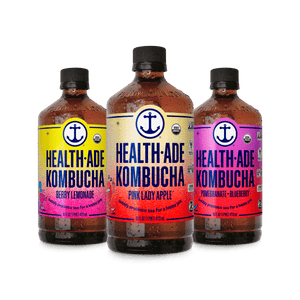
Kombucha | 12 Pack
Fan Favorite Variety Pack
One-time Purchase
49.95

Copied URL to clipboard!
Have you ever felt “butterflies” in your stomach or had a “gut-wrenching” experience? We use these popular expressions to describe some of the connections we feel between our gut and brain on a regular basis.
So in honor of Mental Health Awareness Month, we’re exploring the gut-brain connection and discussing a few simple habits you can practice to support your gut, mind, and body!
Your gastrointestinal (GI) tract is sensitive to emotion. Your brain can send signals of excitement, anger, stress, anxiety, and other feelings to your gut, sparking an array of digestive symptoms. Similarly, your gut can also send signals to your brain! This is what we refer to as the gut-brain connection.
Your gut is regulated by a part of the nervous system called the enteric nervous system. This nervous system is sometimes referred to as the “second brain” because it uses some of the same chemicals as the brain to help you digest food and alert your senses when something is wrong.
You’re made up of roughly 30 trillion human cells and 38 trillion bacteria (1). These “bugs” might be small, but they’re mighty important and play a big role in both your digestive and overall health.
As with most areas of health-related research, we need further studies to fully understand the connection between the brain and gut microbiome. Nevertheless, I’m so excited to see where this is headed!
Your gut health and your mental health both play big roles in your overall wellbeing, and we’re all about helping you support both! Here are a few habits to practice on a regular basis that have been shown to support your first and second brain:
Enjoy movement outdoors! Your body gets vitamin D through sun exposure. Low levels of this vitamin may contribute to fatigue, depression, and seasonal affective disorder. Movement can also support your mood, boost your feel-good brain chemicals, and aid in smooth digestion.
Add colors to your plate. Fiber promotes healthy digestion and can offer your gut prebiotics, which feed the good bacteria present in your gut. Some research also suggests that a higher fiber intake is related to a reduced risk of depression and anxiety (3,4).
You can find fiber in colorful plant foods like fruits, veggies, whole grains, nuts, and seeds. If you feel like you aren’t getting enough fiber, try adding a handful of colors to your daily meals and snacks. You can also crack open a can of SunSip for a few extra grams of prebiotic fiber that your gut (and tastebuds) will love!
Have fun with fermented foods. Fermented foods and beverages like yogurt, kefir, kimchi, and kombucha can all be sources of probiotics that help increase the amount and diversity of good bacteria present in your gut. There’s even some new research that connected a strain of bacteria found in many fermented foods to improved mental health outcomes in mice (5). I’m hoping for more human research to come soon, but these findings are promising!
So whether you’re building a yogurt bowl, topping your favorite rice dish with kimchi, or pouring a glass of bubbly booch, try to have fun with these fermented foods and beverages! Your gut and your brain will thank you.
Here’s to you, your brain, and your gut this Mental Health Awareness Month!
Sources: